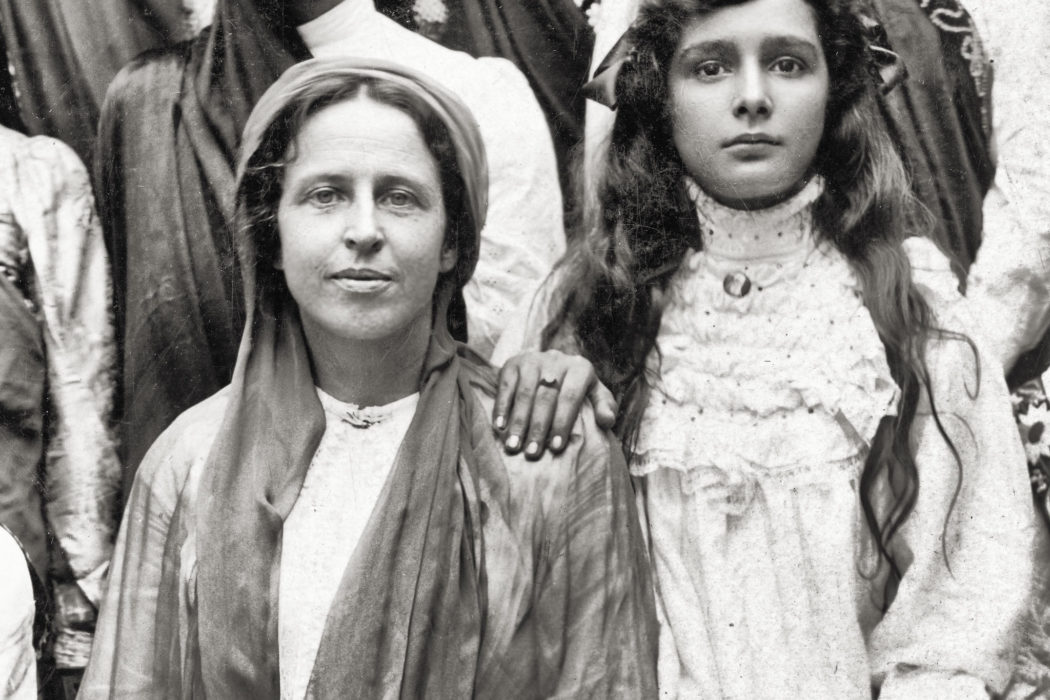AT ABOUT MIDNIGHT ON December 8, 1898, dozens of pairs of eyes peered at Louisa Moore Getsinger through the darkness of a poorly-lighted coffee house near the beach where the ship had dropped them off. Lua was a long way from home: this was Haifa, an outpost of the Ottoman Empire on the shores of the Holy Land. A group of men sat cross-legged on the floor, sipping tea, and speaking Persian and Arabic. One of them nodded; the rest stared in amazement.
Earlier that year Lua had set out for California to teach one of the most powerful women in America about Bahá’u’lláh. Strong-willed, fearless, passionate, restless: that’s how her friends would eventually come to describe Lua.
The woman she met was Phoebe Apperson Hearst, wife of the Senator from California, George Hearst, who had died in 1891. Mrs. Hearst still actively managed America’s largest private mining company, which she had inherited from her husband. She was a feminist, a suffragist, and one of the nation’s most generous philanthropists. Her son, publisher William Randolph Hearst, was busy building an empire of his own.

That’s how Lua’s trip here, to the Bay of Haifa, began. Mrs. Hearst had originally planned a winter cruise down the River Nile, but now the trip had become a pilgrimage to the prison city of ‘Akká to meet ‘Abdu’l-Bahá.
Everything was wrapped in secrecy so as not to arouse the suspicion of the authorities, because ‘Abdu’l-Bahá was still a prisoner under house arrest. The group of fifteen pilgrims had been instructed to arrive in the Holy Land in groups of two. Lua and her husband, Edward, were the first to arrive.
They waited almost two days before receiving permission to proceed to ‘Akká, a five-mile journey on horseback along the sandy edge of Haifa Bay. Lua later wrote of the “violent beating of my heart.” When she first laid eyes on ‘Abdu’l-Bahá she ran to him, threw herself at his feet, and cried like a child.
“Arise and be of good cheer!” she remembers ‘Abdu’l-Bahá saying. He wasn’t one for outbursts of devotion, not to mention people prostrating themselves at his feet. Lua would stay in the Holy Land for four months, learn to speak Persian, and listen as ‘Abdu’l-Bahá instilled in her the need for women to arise and do “great things.”
Lua traveled to ‘Akká again in the summer of 1900. Then in 1902 she stayed a full year to teach English to ‘Abdu’l-Bahá’s family. Upon returning to America she toured the country teaching her new religion. ‘Abdu’l-Bahá would later send her to Europe, travel across America with her in 1912, and then dispatch her to India in 1913. For over a decade she was continually homesick, chronically short of funds, and plagued by frequent illness. ‘Abdu’l-Bahá told her repeatedly that giving birth to a divine religion is achieved through sacrifice.
Lua was with ‘Abdu’l-Bahá in Palestine when the Great War broke out. She was there when the bombs begin to drop on ‘Akká. In August, 1915, ‘Abdu’l-Bahá sent her to safety in Cairo. She was seriously ill for most of the winter, but continued to teach.
Lua Getsinger died unexpectedly of heart failure on May 2, 1916. She was just forty-three.






